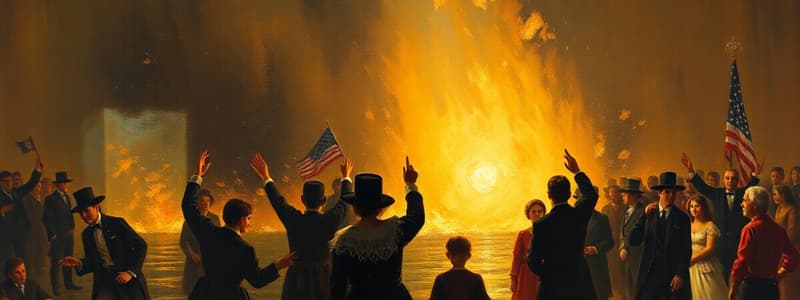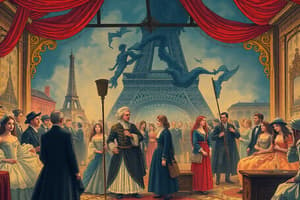Podcast
Questions and Answers
What was a significant outcome of the French Revolution?
What was a significant outcome of the French Revolution?
The Reign of Terror led to a period of peace and stability in France.
The Reign of Terror led to a period of peace and stability in France.
False
Who rose to power as a result of the instability following the French Revolution?
Who rose to power as a result of the instability following the French Revolution?
Napoleon Bonaparte
The _____ of the French Revolution serves as a warning of how radical revolutions can turn violent.
The _____ of the French Revolution serves as a warning of how radical revolutions can turn violent.
Signup and view all the answers
Match the following outcomes of the French Revolution with their descriptions:
Match the following outcomes of the French Revolution with their descriptions:
Signup and view all the answers
What was a major cause of discontent among the Third Estate prior to the French Revolution?
What was a major cause of discontent among the Third Estate prior to the French Revolution?
Signup and view all the answers
The Reign of Terror was a period marked by political stability and the protection of personal freedoms.
The Reign of Terror was a period marked by political stability and the protection of personal freedoms.
Signup and view all the answers
Who was executed as a result of the radical phase of the French Revolution?
Who was executed as a result of the radical phase of the French Revolution?
Signup and view all the answers
The ______ was stormed on July 14, 1789, symbolizing the start of the French Revolution.
The ______ was stormed on July 14, 1789, symbolizing the start of the French Revolution.
Signup and view all the answers
Match the figure with their role during the French Revolution:
Match the figure with their role during the French Revolution:
Signup and view all the answers
Which of the following documents asserted fundamental rights and freedoms during the French Revolution?
Which of the following documents asserted fundamental rights and freedoms during the French Revolution?
Signup and view all the answers
The Directory was a period noted for its political stability and lack of corruption.
The Directory was a period noted for its political stability and lack of corruption.
Signup and view all the answers
What phase of the French Revolution was characterized by the reaction against the Reign of Terror?
What phase of the French Revolution was characterized by the reaction against the Reign of Terror?
Signup and view all the answers
Study Notes
Causes of the French Revolution
- Growing discontent among the Third Estate (commoners), who bore the brunt of taxation while having little political power.
- Inefficient and corrupt French government, with extravagant spending by the monarchy.
- Widespread poverty and food shortages, exacerbated by poor harvests.
- Enlightenment ideas emphasizing reason, liberty, and equality, inspiring calls for reform and challenging traditional authority.
- Influence of the American Revolution, demonstrating that successful revolution was possible.
- High national debt from involvement in costly wars, particularly the American Revolutionary War.
Stages of the French Revolution
- Moderate Phase (1789-1792): The storming of the Bastille, the declaration of the National Assembly, and the abolition of feudal privileges. Establishment of the National Constituent Assembly.
- Radical Phase (1792-1794): The Reign of Terror, led by Maximilien Robespierre, characterized by mass executions of perceived enemies of the revolution. The execution of Louis XVI and Marie Antoinette. Rise of the Committee of Public Safety.
- Thermidorian Reaction (1794-1795): A reaction against the Reign of Terror, marking a shift back towards a more moderate form of government. The execution of Robespierre.
- Directory (1795-1799): A five-member executive body that ruled France. This period was marked by political instability and corruption.
Key Figures
- Louis XVI: The French King during the revolution, ultimately executed.
- Marie Antoinette: The Queen of France, also executed.
- Maximilien Robespierre: A key figure in the Reign of Terror, a period of extreme violence and executions.
- Georges Danton: A prominent revolutionary leader, initially supportive of executions, later opposed to the Reign of Terror's excesses.
- Jean-Paul Marat: A journalist and radical revolutionary, associated with the Reign of Terror.
- Napoleon Bonaparte: Initially a military officer, later rose to power during the Directory and became Emperor.
Key Events
- Storming of the Bastille (July 14, 1789): A symbolic act of defiance against the monarchy, marking the start of the revolution.
- Declaration of the Rights of Man and of the Citizen (August 26, 1789): A document asserting fundamental rights and freedoms.
- Execution of Louis XVI (January 21, 1793): A critical turning point, signifying the revolution's radicalization.
- Reign of Terror (1793-1794): A period of intense violence and mass executions.
- Thermidorian Reaction: A reactionary shift away from the radical policies of the Reign of Terror.
- Rise of Napoleon Bonaparte: Napoleon played a military role in stabilizing the nation after the instability of the Directory.
Outcomes of the French Revolution
- End of the French monarchy: The revolution abolished the monarchy and established a republic.
- Spread of revolutionary ideas: The ideas of liberty, equality, and fraternity had a profound impact on other parts of Europe and the world.
- Rise of nationalism: The revolution fostered a sense of French national identity.
- Economic and social reforms: Reforms were implemented in land ownership and taxation, with some improvements in the lives of commoners.
- Rise of Napoleon: The revolution created an environment where Napoleon could seize power.
- Legacy of instability and violence: The Reign of Terror serves as a cautionary example of how radical revolutions can turn violent.
Impact of the French Revolution
- Spread of Enlightenment ideas: The French Revolution greatly accelerated the spread of Enlightenment ideas throughout Europe.
- Inspiration for other revolutions: Inspired revolutionary movements and ideals throughout Europe, including Latin America, and elsewhere.
- Foundation for modern political ideologies: Key concepts and ideas that emerged from the French Revolution, such as democracy, nationalism, and human rights, have had a long-lasting impact on modern political systems.
- Shifting power dynamics: The revolution shifted power and authority from the monarchy to the people, impacting political structures across Europe.
Studying That Suits You
Use AI to generate personalized quizzes and flashcards to suit your learning preferences.
Description
This quiz explores the key causes of the French Revolution, including social discontent among the Third Estate and the influence of Enlightenment ideas. It also covers the different phases of the revolution, highlighting major events such as the storming of the Bastille and the Reign of Terror.




